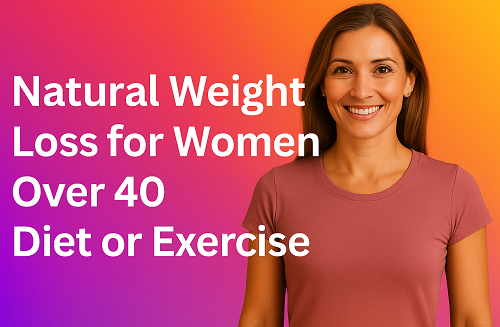Losing weight after 40 can be a unique challenge for women due to hormonal shifts, slower metabolism, and demanding lifestyles. However, restrictive diets and intense exercise aren’t the only paths to weight loss. By adopting sustainable, natural strategies, women over 40 can shed pounds while enhancing overall health. This article explores science-backed methods to lose weight naturally without diet or exercise, tailored for women in this age group, and includes relevant data on weight loss trends in the United States to provide context.
Weight Loss in the United States: A Snapshot
Obesity and weight management are significant public health concerns in the United States. According to the Centers for Disease Control and Prevention (CDC), from 2017-2020, approximately 41.9% of U.S. adults were obese, with women slightly more affected than men (43.3% vs. 40.3%). Among women aged 40-59, the prevalence of obesity is even higher, at 45.6%. Additionally, a 2023 Gallup poll found that 56% of Americans actively want to lose weight, with women over 40 being a significant demographic seeking sustainable solutions. These statistics highlight the need for accessible, natural weight loss strategies that don’t rely on restrictive diets or intense exercise, especially for women navigating midlife changes.
Below, we outline practical, holistic ways to lose weight naturally, tailored for women over 40, to support long-term health and weight management.
Why Weight Loss After 40 Is Different for Women?
As women enter their 40s, hormonal changes, particularly during perimenopause and menopause, can lead to weight gain. Declining estrogen levels contribute to increased abdominal fat and insulin resistance. Metabolism slows by about 5% per decade after age 40, and age-related muscle loss (sarcopenia) reduces calorie-burning capacity. Stress, poor sleep, and busy schedules further complicate weight management. Fortunately, small, intentional lifestyle changes can address these challenges without requiring extreme measures.
1. Prioritize Quality Sleep
Sleep is critical for weight regulation, as it influences hunger hormones like ghrelin (which stimulates appetite) and leptin (which signals fullness). Poor sleep increases ghrelin and decreases leptin, leading to overeating. A 2021 study in The Journal of Clinical Endocrinology & Metabolism found that women getting less than 7 hours of sleep per night were more likely to gain weight.
How to Improve Sleep:
Set a consistent schedule: Aim for 7-9 hours of sleep by maintaining regular bed and wake times.
Limit blue light exposure: Avoid screens 1-2 hours before bed to support melatonin production.
Optimize your sleep environment: Keep your bedroom dark, quiet, and cool (60-67°F).
Avoid late caffeine: Refrain from consuming caffeine after 2 p.m. to prevent sleep disruption.
Better sleep supports hormonal balance, reduces cravings, and aids natural weight loss.
2. Manage Stress Effectively
Chronic stress raises cortisol levels, a hormone linked to fat storage, particularly in the belly. For women over 40, stress from work, family, or caregiving can exacerbate weight gain. A 2022 study in Obesity found that high cortisol levels were associated with increased visceral fat in women during menopause.
Stress-Reduction Techniques:
Practice mindfulness: Spend 10-15 minutes daily on meditation, deep breathing, or gentle yoga.
Engage in enjoyable activities: Hobbies like knitting, gardening, or reading can lower stress.
Build social connections: Spend time with supportive friends or family to boost mood.
Explore adaptogens: Consult a healthcare provider about herbs like ashwagandha to manage stress.
Reducing stress not only supports weight loss but also enhances emotional well-being.
3. Stay Hydrated
Hydration is essential for metabolism and appetite control. Dehydration can be mistaken for hunger, leading to unnecessary snacking. A 2019 study in The Journal of Nutrition found that increasing water intake improved weight loss outcomes in women. In the U.S., where sugary drinks contribute to 7% of daily calorie intake (per CDC data), swapping them for water can make a significant difference.
Hydration Tips:
Aim for adequate intake: Drink 8-10 cups (64-80 ounces) of water daily, adjusting for activity and climate.
Enhance water flavor: Add lemon, cucumber, or mint for variety.
Start your day hydrated: Drink a glass of water upon waking to boost metabolism.
Check hydration status: Pale yellow urine indicates proper hydration.
Proper hydration supports fat-burning processes and helps control appetite naturally.
👉👉 Read Here : Natural Weight Loss Supplement for Women Over 35
4. Optimize Gut Health
A balanced gut microbiome regulates metabolism, inflammation, and weight. Imbalances can lead to insulin resistance and fat storage, particularly in women over 40. A 2020 study in Nature Reviews Gastroenterology & Hepatology linked gut health to weight management success.
Ways to Boost Gut Health:
Eat fiber-rich foods: Include fruits, vegetables, whole grains, and legumes to nourish gut bacteria.
Incorporate fermented foods: Add yogurt, kefir, or sauerkraut for natural probiotics.
Limit processed foods: Reduce sugar and artificial sweeteners, which disrupt gut flora.
Consider probiotics: Consult a doctor about high-quality probiotic supplements.
A healthy gut improves digestion and nutrient absorption, supporting natural weight loss.
5. Balance Hormones Naturally
Hormonal changes during perimenopause and menopause can slow metabolism and increase fat storage. Supporting hormonal balance is key for women over 40. According to a 2021 study in Menopause, lifestyle interventions can mitigate hormone-related weight gain.
Hormone-Balancing Strategies:
Include healthy fats: Avocados, nuts, seeds, and olive oil support hormone production.
Add phytoestrogens: Foods like flaxseeds, soy, or lentils may ease hormonal fluctuations.
Avoid endocrine disruptors: Use glass or stainless steel containers to limit exposure to chemicals like BPA.
Monitor thyroid health: Consult a doctor if you experience fatigue or persistent weight gain, as thyroid issues are common in women over 40.
Balancing hormones naturally enhances metabolism and reduces stubborn weight gain.
6. Practice Mindful Eating
Mindful eating helps you tune into hunger and fullness cues, preventing overeating. This is especially helpful for women over 40, who may eat out of stress or habit. A 2018 study in Appetite found that mindful eating reduced emotional eating in women.
How to Practice Mindful Eating:
Eat slowly: Take 20 minutes per meal to allow your brain to register fullness.
Minimize distractions: Avoid eating while watching TV or using your phone.
Listen to hunger cues: Eat when hungry and stop when satisfied, not overly full.
Track eating patterns: Use a journal to identify emotional or stress-related eating triggers.
Mindful eating fosters a healthier relationship with food and supports weight management.
👉👉 Read Here : Natural Weight Loss Supplement for Women Over 35
7. Adjust Meal Timing
Meal timing can influence weight loss by aligning with your body’s circadian rhythms. Time-restricted eating or intermittent fasting may improve insulin sensitivity and fat-burning. A 2022 study in Nutrition & Diabetes found that time-restricted eating helped women over 40 reduce body fat.
Meal Timing Tips:
Try time-restricted eating: Eat within an 8-10 hour window (e.g., 9 a.m. to 5 p.m.).
Eat earlier: Have larger meals when your metabolism is more active, and keep dinner light.
Avoid late-night eating: Stop eating 2-3 hours before bed to support overnight fat burning.
Strategic meal timing enhances your body’s natural ability to manage weight.
8. Increase Non-Exercise Physical Activity (NEAT)
Non-exercise activity thermogenesis (NEAT) refers to calories burned through daily activities like walking or standing. Increasing NEAT is an accessible way to boost calorie expenditure without structured exercise. A 2019 study in The American Journal of Clinical Nutrition estimated that NEAT can account for 10-20% of daily calorie burn.
Ways to Boost NEAT:
Walk more: Take short walks during breaks or after meals.
Stand frequently: Use a standing desk or stand while doing tasks like ironing.
Do household chores: Activities like cleaning or gardening increase NEAT.
Choose stairs: Opt for stairs over elevators to burn extra calories.
Incorporating NEAT into daily life can significantly contribute to weight loss.
9. Choose Nutrient-Dense Foods
While avoiding strict diets, focusing on nutrient-dense foods supports metabolism and satiety. In the U.S., where processed foods contribute to 60% of adult calorie intake (per CDC data), prioritizing whole foods is key for women over 40.
Nutrient-Dense Food Choices:
Protein: Eggs, fish, chicken, or tofu help maintain muscle and keep you full.
Healthy fats: Avocados, nuts, and olive oil support hormone health.
Complex carbs: Quinoa, brown rice, or oats provide sustained energy.
Colorful vegetables: Aim for variety to maximize nutrient intake.
Nutrient-dense foods support metabolism and reduce cravings naturally.
10. Build a Support System
A support system boosts motivation and accountability, which are crucial for sustainable weight loss. A 2020 study in The Lancet Public Health found that social support improved weight loss outcomes in women.
How to Build a Support System:
Join communities: Participate in online or local wellness groups for women over 40.
Share goals: Tell trusted friends or family about your health intentions.
Seek professional guidance: Work with a nutritionist or coach specializing in midlife health.
Support systems help you stay consistent and navigate challenges effectively.
👉👉 Read Here : Natural Weight Loss Supplement for Women Over 35
Conclusion:
For women over 40 in the United States, where obesity affects nearly half of this demographic, losing weight naturally without diet or exercise is achievable through mindful lifestyle changes. Prioritizing sleep, managing stress, staying hydrated, and supporting gut and hormonal health can lead to sustainable weight loss while improving overall well-being. Start with one or two strategies and build gradually for lasting results. Always consult a healthcare provider before making significant changes, especially if you have health conditions. By embracing these natural approaches, you can achieve a healthier weight and thrive in midlife.

